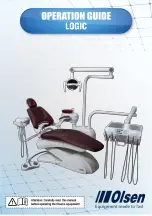
How To ...
56
© 1995-2005 Vibration Research Corporation. All rights reserved.
HTML Reports
HTML reports are used with the Optional WebServer module. Vibration Research has included a full
set of HTML reports to provide remote data access and test control. HTML files are always stored in
the C:\Program Files\
VibrationVIEW
4\templates\<test type>\html directory (where <test type> is Data
Replay, Random, Shock, Sine, or System Check.
HTML reports can be generated with any HTML editor. The data fields can be inserted at any point on
the page by inserting [PARAM:name] where the square-brackets indicate the beginning and ending of
the field, and the first 6 characters of the field are PARAM: in all uppercase letters. Graphs can also be
placed in the file using a graph field [GRAPH:type,flag1,flag2] where the square brackets indicate the
beginning and ending of the field, and the first 6 characters of the field are GRAPH: in all uppercase
letters.
See Also:
2.8.2
How to use data entry forms
How to use data entry forms
Data entry forms can be used to schedule data entry at any time during the test. Typically a data entry
form is used to record test setup at the start of a test. The most recent data entry form data is
accessable from the report.
The forms are html (hypertext markup languague) files which typically are located in
C:\VibrationVIEW5\Program Files\Templates\Sine\Forms, C:\VibrationVIEW5\Program
Files\Templates\Random\Forms, C:\VibrationVIEW5\Program Files\Templates\Shock\Forms, or
C:\VibrationVIEW5\Program Files\Templates\DataReplay\Forms. The html file can contain any html
element which can be displayed by Internet Explorer. A typical html form file contains a single form
with controls for text entry. The text can be automatically inserted into the test report. With a form the
data entry can occur during test setup, and the appropriate report run at the end of the test.
An HTML form is a section of a document containing normal content, markup, special elements called
controls (checkboxes, radio buttons, menus, etc.), and labels on those controls. Users generally
"complete" a form by modifying its controls (entering text, selecting menu items, etc.), before
submitting the form to
VibrationVIEW
for processing.
Each HTML form has these requirements:
1)
The form tag must be
<form action="Continue" method="POST">.
The POST method is used to
submit the data to
VibrationVIEW
2)
The form must have a method to submit the data to
VibrationView
. Typically it is a input control
button
<input type="submit" value="Continue" name="continue">.
Any input button with
value="Continue" and name="continue" is designated to submit the form to
VibrationVIEW
and
continue the test
3)
The form may have a method to submit the data to
VibrationVIEW
and abort the test. Typically it
is a input control button
<input type="submit" value="Abort" name="abort">.
Any input button with
value="
Abort
" and name="
abort
" is designated to submit the form to
VibrationVIEW
and abort the
test
4)
An optional <META PageWidth=width PageHeight=height> may be inserted in the <head> section
of the html file to set the width and height of the entry form when displayed from
VibrationVIEW.
The form controls are identified from the
VibrationVIEW
report by the HTML property
name="fieldname".
The html entry can be inserted on a
VibrationVIEW
report using a
[FORM:fieldname] merge fields.
Example Entry Form:
<!DOCTYPE HTML PUBLIC "-//W3C//DTD HTML 4.0 Transitional//EN">
<html>
305
Summary of Contents for VibrationVIEW
Page 15: ...Document Revision Part I ...
Page 17: ...How To Part II ...
Page 96: ...Menu commands Part III ...
Page 142: ...Test Definition Part IV ...
Page 217: ...Control Centers Part V ...
Page 227: ...Accelerometer Toolbars Part VI ...
Page 231: ...Stop Codes Part VII ...
Page 263: ...Typical Views Part VIII ...
Page 268: ...VibrationVIEW Help 255 1995 2005 Vibration Research Corporation All rights reserved ...
Page 269: ...Dialog Boxes Part IX ...
Page 303: ...Windows Elements Part X ...
Page 309: ...APPENDIX Part XI ...
Page 311: ...APPENDIX 298 1995 2005 Vibration Research Corporation All rights reserved ...
















































